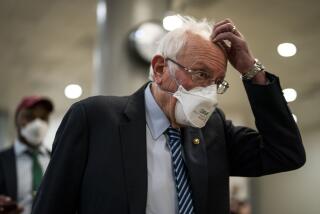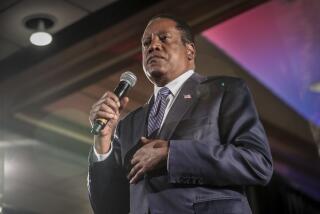Edwards Isn’t Leading, but Proves Winning Ways
- Share via
GREEN BAY, Wis. — To learn how John Edwards reels in voters on the Democratic presidential campaign trail, watch his restless hands.
With a wireless microphone clipped to his necktie, the senator from North Carolina points to his heart, to reinforce his passion; his head, to underscore his ideas; his mouth, to remind voters of the potential advantage for Democrats of a candidate with a Southern drawl.
As he pounds home his theme of “two Americas” -- one of privilege, one in pain -- he clenches a fist and chops at his palm for emphasis.
Often, he spreads his arms to illustrate his vision of an inclusive, unified nation that fights poverty and embraces civil rights. And he grabs the lapels of his suit jacket to invoke the image of “armies” of slick corporate litigators whom he opposed as a trial lawyer seeking, as he viewed it, to redress wrongs done to common people.
His persona also benefits from factors cosmetic -- the coiffed brown hair, the dazzling smile -- and substantive -- a relentless optimism and empathy, a steadfast refusal to attack rival Democrats and a skillful ability to skewer President Bush without displaying over-the-top partisan anger.
It adds up, many observers of the campaign say, to undeniable charisma. And from a crowded field that once had 10 contenders, Edwards has emerged as the chief rival to the Democratic front-runner, Sen. John F. Kerry of Massachusetts.
Kerry has won most of the nominating contests, but Edwards beat him in South Carolina and has finished a solid second in several other states. His performance has significantly boosted the one-term senator’s political profile -- it could lift him onto the Democratic ticket as a vice presidential candidate; at the least, it may pave the way for a future White House run.
Already, Edwards, 50, is acclaimed by some Democrats as the party’s best campaign speaker since Bill Clinton.
“He gives a hell of a speech, that’s for sure,” said Steve Murphy, who managed the failed candidacy of Rep. Dick Gephardt (D-Mo.). “He’s a very talented communicator.”
“There’s just a sparkle in his eye, the way he weaves a story,” said Joe Erwin, South Carolina’s Democratic Party chairman. “Just watching him work a crowd, he has that quality of enthusiasm and passion and stays clearly on his message.”
In Wisconsin, which holds its primary Tuesday, Edwards drew roughly 300 people the other night to a town-hall-style meeting at the University of Wisconsin-Green Bay.
They heard the candidate pledge to fight for the working class and belittle a recent Bush administration report praising the economic benefits of “outsourcing” U.S. jobs overseas.
“When I am your president, I will believe in you and I will stand up for you,” Edwards told them. He added that voters should “outsource this administration.”
The crowd stood and cheered. Edwards laughed with them. “I’m just glad you’re having as much fun as I am,” he said.
After he spoke for 20 minutes and took questions for another 10, people crowded around him. He autographed copies of his book, “Four Trials,” which focuses on his legal career, shook numerous hands and heard one man’s urgent appeal for aid to military veterans.
“I’ll do everything in my power,” Edwards said, locking in on him.
He also posed for a snapshot with 18-year-old twins who slung their arms over his shoulders. Joel Charles said afterward he would cast his first presidential vote for Edwards. “He reminded me of JFK, when I watched the History Channel,” Charles said, referring to President John F. Kennedy.
His brother, Jesse, said: “He talked about hope and what we can do, versus what’s wrong. He seems like he genuinely cares.”
To be sure, Wisconsin is not Iowa -- where Edwards emerged from deep in the pack to finish second -- or South Carolina, where he was born. Edwards was able to canvass those two states thoroughly over several months and put his campaign skills to powerful use.
Here, by contrast, a tight political calendar and a pressing need to raise money have given Edwards little time to meet voters one-on-one. On Thursday and Friday, he held small events in the state, then flew to Los Angeles for fundraisers. He also appeared on “The Tonight Show with Jay Leno” Friday.
As a consequence, Edwards has relied more on TV and newspaper coverage to help spread his message in Wisconsin. Given Kerry’s commanding lead in recent statewide polls, Edwards’ chances of catching him appear slim. Regardless, he has said he will forge on to the 10 contests on March 2, including primaries in California and New York.
He may be calculating that he can stay in the race up to that point without penalty as long as he continues to charm voters and avoid attacks on the front-runner. He also may figure that a continued solid performance will help persuade Kerry to pick him as a running mate, though Edwards dismisses questions about the vice presidency several times a day.
If he’s not on the ticket, one challenge facing Edwards will be staying in the public eye. In launching his presidential campaign, he decided to pass on running for reelection. But most Democratic analysts think he will find a niche that keeps his voice heard.
In this campaign, he successfully identified a message that resonated with Democratic audiences. He condemns broadly what he sees as a democracy hijacked by the economic elite, a foreign policy built on arrogance, and a nation divided internally along racial and class lines. He can often be vague in his prescriptions for change, but he is never anything but upbeat.
“It doesn’t have to be this way,” Edwards tells crowds, urging his own version of a velvet revolution. “You and I, we can do something about this.”
Although unstinting in his criticism of Bush, he has not struck voters as angry -- a characterization that seemed to hurt former Vermont Gov. Howard Dean, the race’s onetime front-runner, as the campaign evolved.
Roxanne Conlin, a leader of the Edwards campaign in Iowa, said, “There is a difference between being mean and being tough. John Edwards is tough.”
But Edwards doesn’t seem tough as he works a crowd. Part boy next door and part celebrity, Edwards is showered by words of support at his events. “Bless your heart,” he replies.
He always tells people to state their names before asking him a question, and he frequently will repeat them for emphasis. He also will ask photographers to get out of the audience’s line of sight, conscious of the need for a visual connection with voters.
“I love having you guys here,” he told photographers crowding close at a New Hampshire diner, “but these folks need to see.”
More to Read
Get the L.A. Times Politics newsletter
Deeply reported insights into legislation, politics and policy from Sacramento, Washington and beyond. In your inbox twice per week.
You may occasionally receive promotional content from the Los Angeles Times.











